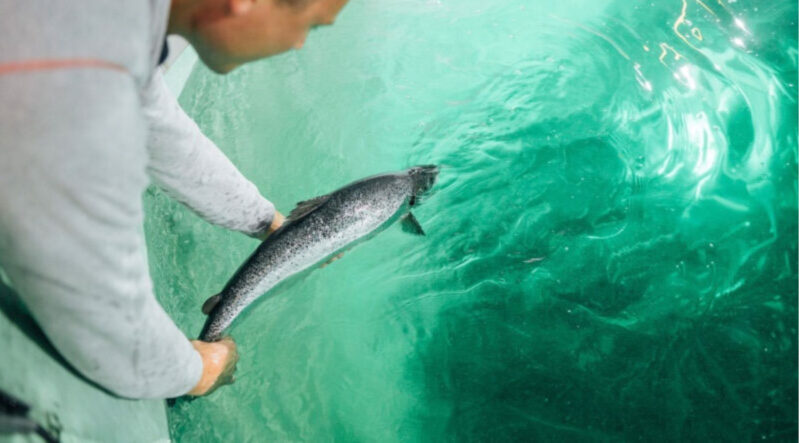Land-based salmon farming is risky business in BC : study
New government study shows BC will need billions of dollars and about 10 years to replace open-net salmon farms with land-based aquaculture operations
By Fabian Dawson
SeaWestNews
Growing salmon in tanks on land to replace ocean-based aquaculture operations in British Columbia faces a slew of environmental, investment, social and regulatory challenges, states a new government-commissioned report.
The report projects that replacing BC’s current salmon farm production with recirculating aquaculture systems (RAS), also known as land-based or closed containment operations, would require a direct investment of between $1.8 billion to $2.2 billion.
The report authors from Counterpoint Consulting Inc. estimate that it will be at least 10 years before a significant land-based salmon production sector is operating at a steady rate in BC.
The Province of BC commissioned the report, which includes an economic analysis of farming salmon using RAS technology in response to the federal government’s commitment to transitioning the BC salmon farming sector by 2025.
Farm-raised salmon is BC’s highest valued seafood product, the province’s top agricultural export, and generates over $1.2 billion towards the provincial economy, creating thousands of jobs. About 97 per cent of salmon produced in Canada is farm-raised.
The economic analysis also states that the profitable production of market-sized salmon on a commercial scale remains “elusive”. Currently, salmon raised in ocean-based pens are grown to between five and six kilograms, while those raised in RAS facilities are harvested at less than four kilograms in most cases, further making the technology economically unviable.
The BC coalition of First Nations for Finfish Stewardship (FNFFS) has said that moving to land-based salmon farming is not an option for its members.
“Some Nations in this coalition have completed feasibility studies on land-based salmon farming in their territories for many years, and they came to the same result: it is not possible, and if it was, they would have moved to land-based salmon farming years ago,” FNFFS said.
Brian Kingzett, Executive Director for the BC Salmon Farmers Association said the new report released by the province supports what salmon farmers have been saying for many years.
“Our sector strongly supports RAS technology – in fact we are experts at using RAS to grow salmon – but to move the entire sector on land isn’t a realistic option, nor is it required to protect wild salmon,” he said.
“The federal government’s numerous science assessments have confirmed Atlantic salmon farms pose no more than a minimal risk to wild salmon abundance and diversity under the current fish health management practices. The challenges identified in the report need to be addressed before we could even consider this.”
Brock Thomson, Innovation Director for Cermaq Canada said: “We are currently trialing new technologies such as semi-closed containment and hybrid systems to systematically reduce interactions with wild salmon and improve fish health.
“We understand land-based technology, but given the constraints faced, we do not see fully moving to land-based production as a viable solution in the remote, coastal communities where we farm.”
Other challenges to land-based RAS grow-out facilities include the global shortage of a trained workforce, fish health, off-flavour fish, brood stock development and stocking densities.
It mirrors an earlier government report – The State of Salmon Aquaculture Technologies study released in February 2020 which warned RAS technology requires the use of large amounts of land, water, and power, and thus has a significant environmental footprint, in particular greenhouse gas emissions.
Global fisheries, aquaculture and climate scientists have labelled the activism around moving all BC salmon farms to land based operations as unrealistic, reckless, and destructive because growing the global supply of salmon on land would require the same amount of energy per year needed to power a city of 1.2 million people and contribute to higher CO2 emissions.
Raising land based Atlantic salmon also costs 12 times more than ocean farming, they said.
(Facebook File image shows a RAS operation)

